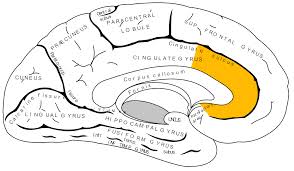The ACC helps entities stay on track to reach goals or change course in case of danger or failure. The ACC may participate in systemic failure to stay on course or to respond to failure/danger in two directions:
First, there is a possibility that the ACC may be involved in autism. Perhaps the initial Bayesian level is set so high that only identical elements match or perhaps filters that handle perception that feeds state information to the ACC are unable to abstract or match patterns. Regardless of the source of the problem, autistic people are unable to find matches between states that are slightly dissimilar, which leads to an inability to form concepts and make predictions. This process involves the ACC.

Secondly, some people may have the opposite problem. Their requirements for a match are set very low so most states appear similar. These people may tend to see the world quite creatively but may ignore important distinctions between objects, processes and situations that could result in continuing in dangerous or undesirable directions.
Currently, Homo communicatus appears to have no centralized ACC. However, groups do develop goals, milestones and expectations and compare them. Such data-driven organizations are becoming more popular. Crowd decision-making and actions will continue the move toward development of global ACC's. The malfunctions that occur in individuals may provide clues to monitoring the proper function of global ACC's.